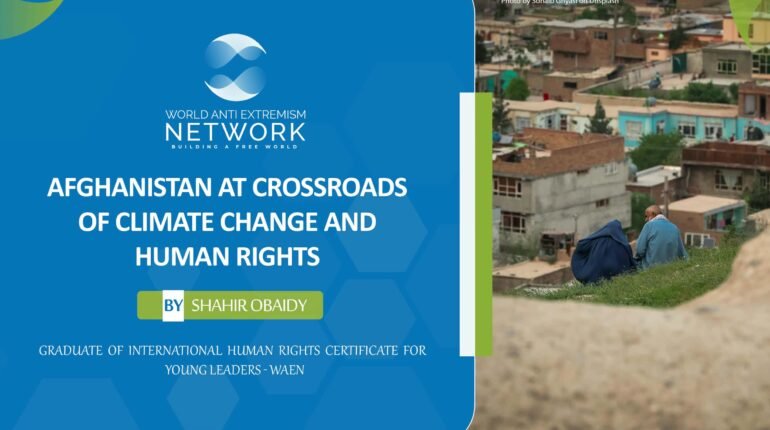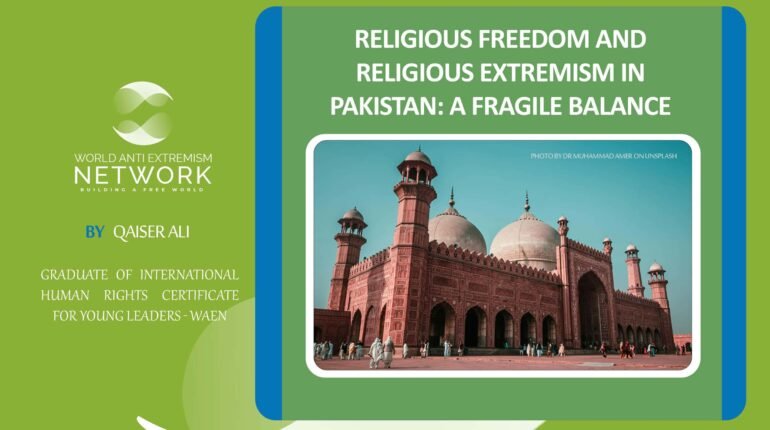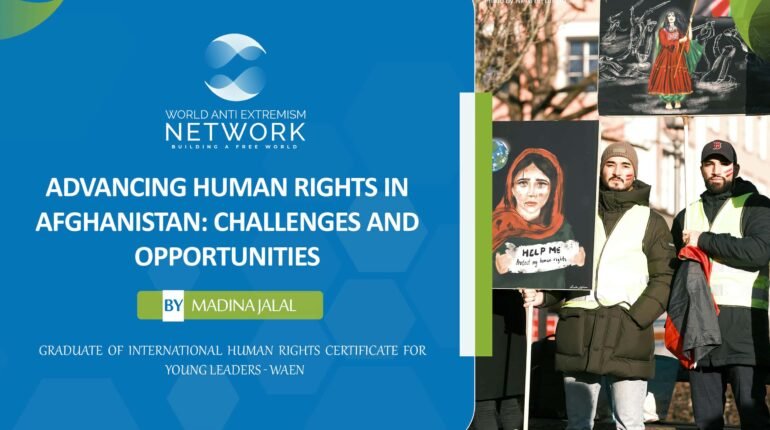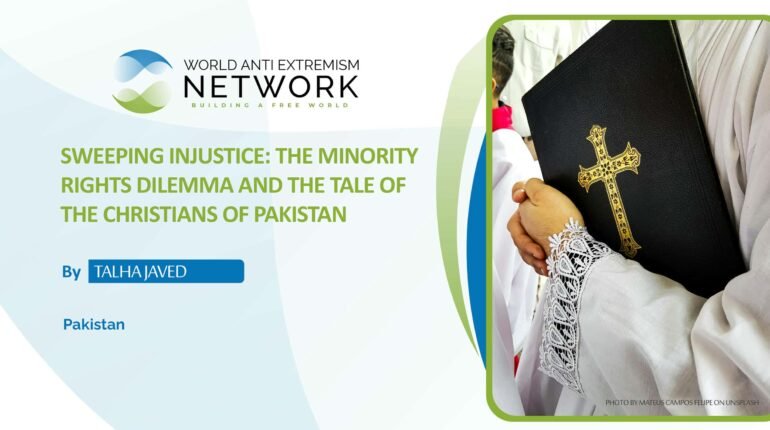The United States of America: The Effects of the Current Administration’s Global Priorities
- World Anti Extremism Network
- The United States of America: The Effects of the Current Administration’s Global Priorities
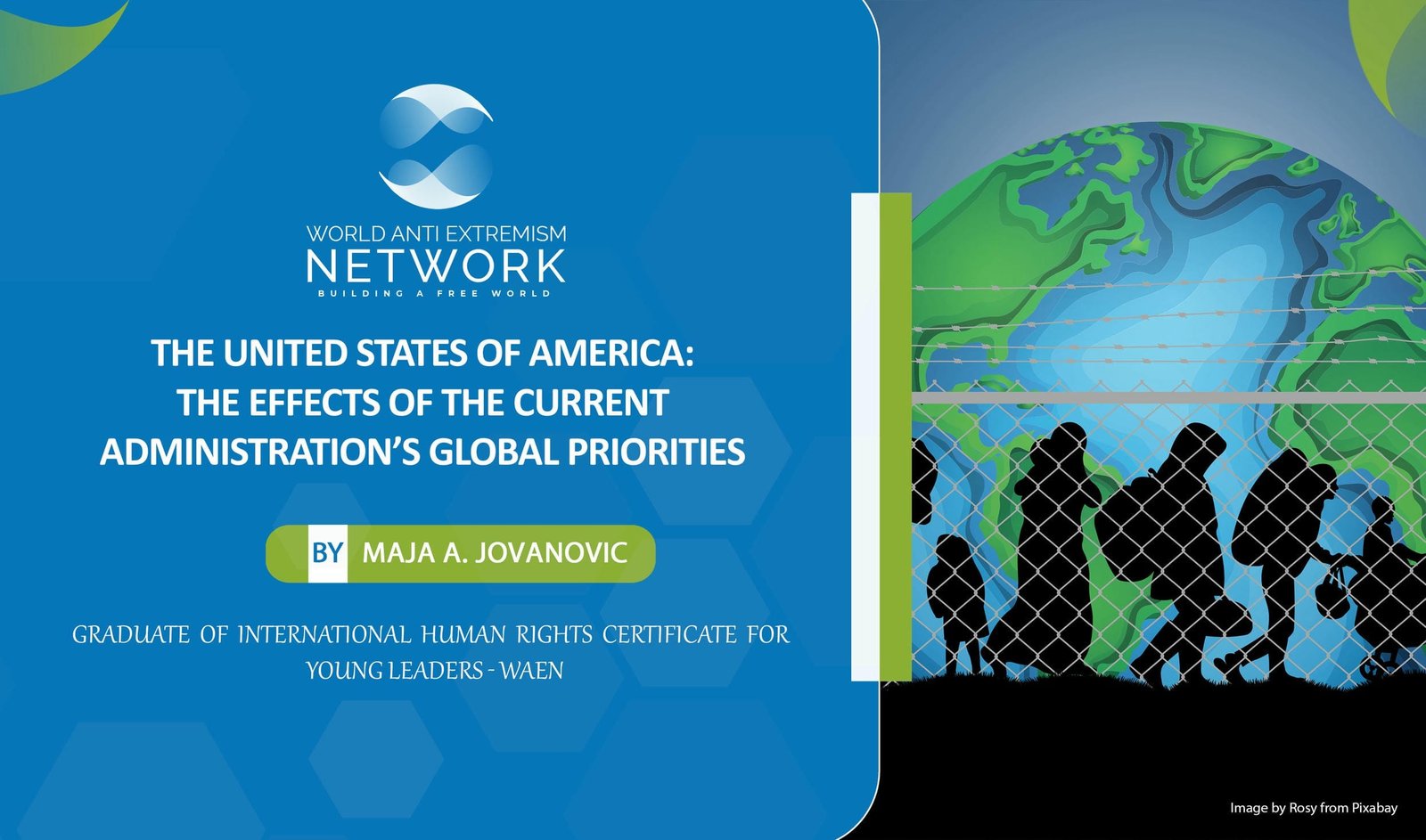
- The United States of America: The Effects of the Current Administration’s Global Priorities
- By Maja A. Jovanovic
- April 4, 2025
Share on:
The United States of America has a long history of being involved in international affairs, including being a founding charter member of the United Nations in the late days of World War II. Following the war, “(i)n the interest of avoiding another global war, for the first time the United States began to use economic assistance as a strategic element of its foreign policy and offered significant assistance to countries in Europe and Asia struggling to rebuild their shattered economies.” In 1947, the Truman Doctrine established that the US would support democracies under the threat of authoritarianism. This moved US foreign policy towards a practice of getting involved in regional conflicts even when US interests were not directly involved. Additionally, the United States has been deeply involved with the United Nations High Commissioner for Refugees (UNHCR) since the organization’s inception after WWII. The US welcomed over 100,000 refugees worldwide in the fiscal year of September 30, 2024.
President Donald Trump’s second administration began in January 2025 with a strong emphasis on putting American interests above all others on the global stage. As of the 14th of March, Trump has signed 89 executive orders, as reported by the Federal Register. According to the American Civil Liberties Union (ACLU), “an executive order is a written directive, signed by the president, that orders the government to take specific actions to ensure ‘the laws be faithfully executed.” While these executive orders legally can not violate federal law or bypass the checks and balances system in the United States, the administration has utilized them to advance its agenda and circumvent decisions that would otherwise require congressional approval.
These executive orders have had humanitarian, political, and economic effects across the nation and the world. While there have been dozens of executive orders, two in particular stand out.
Refugee Admissions
On January 20, 2025, President Trump signed an executive order freezing all US refugee and asylum admissions and processes for 90 days. He requires that the Secretary of Homeland Security and the Secretary of State review the refugee and asylum admission program and determine if continuing the program is in the best interest of the United States. This order stopped all US-bound refugee and asylee applications regardless of where the person was in the process. Even those who were done with the lengthy process and were just waiting to be able to travel but had not yet physically arrived in the US were stopped from proceeding to the US. While the order allows a case-by-case exception determined by the Secretary of Homeland Security, as of the current time, there does not appear to be anyone who was allowed an exception for entry into the United States.
While the immediate assumption is that ceasing the arrival of refugees will have minimal negative impact on the US, current research indicates otherwise. The International Rescue Committee reports that the evidence indicates that refugees contribute significantly to the local economy and businesses, often becoming entrepreneurs. The arrival of refugees is credited with rejuvenating blighted and poverty-stricken towns and cities across the US.
An analysis by the Center for Global Development reports that by limiting refugee admissions, the US economy will experience economic loss. A report about the reduction of refugee admissions during the first Trump Administration indicates that the US economy has lost a potential $9.1 billion as a result of their lost economic contributions. These losses impact all levels of the economy, including local and national.
Those leading the national reduction efforts appear to be operating under the mistaken belief that refugees and asylees cost the US far more than they contribute. While there are short-term expenditures to resettle the refugees, their long-term positive economic impact far outweighs the initial costs. According to a report by the US Department of Health and Human Services in 2024, during 15 years from 2005-2019, the United States economy experienced a net positive benefit of $123.8 billion from the refugees and asylees admitted during that time.
Human Impact of Ban- Outside of the US
President Trump’s halting of refugee and asylee admissions has a very real human impact. Mohammad (his full name is not being used to protect his identity) and his family fled Afghanistan five days after the fall of the Islamic Republic on August 15, 2021. Despite having a college degree and extensive work experience with multiple human rights organizations, the family ended up in Pakistan, like many other Afghan people, living in a state of harassment, underemployment, and uncertainty. The family was on the verge of being resettled in the United States, a country they had long supported and considered an ally, when the order to cease all refugee movement into the United States was initiated. He reports that spending over three years navigating the process of resettlement as refugees and suddenly having it stopped has caused significant emotional distress.
Pakistan is experiencing its challenges in part due to the millions of Afghan refugees living within its borders. As a country that does not have a formal process to accept and process refugees, the country is overwhelmed with managing the tremendous need for services. This has resulted in deportations and reports of harassment and violence against the Afghan people living in Pakistan. International organizations have been working with the Afghan government to manage the migration process. The sudden cessation of the US accepting tens of thousands of refugees in the process of being resettled in the US has caused an increased level of conflict. As many Afghan people have settled in the capital city of Islamabad, the Pakistani government has given a deadline of March 31, 2025, for all Afghan refugees to leave the city. Mohammad and his family are now faced with the very real fear of being sent back to Afghanistan, where there is no guarantee for their safety and security. In Mohammad’s words, “The United States’ allies placed their trust in its promises, and if we played a role in supporting its objectives, we now ask for its support in return. We do not deserve to be discarded like something no longer useful, ignored, and forgotten.”
Foreign Humanitarian Aid
The cessation of admittance of refugees and asylees is not the only executive order having a humanitarian and economic impact. On January 20, 2025, President Trump signed an executive order stating “that no further United States foreign assistance shall be disbursed in a manner that is not fully aligned with the foreign policy of the President of the United States.” This executive order directly affected US foreign aid, including the activities and support of the United States Agency for International Development (USAID).
The US Agency for International Development has been the main government agency that supplies assistance and aid to countries recovering from disasters, experiencing poverty, building democratic reforms, and dealing with health crises. USAID has a long history of supporting humanitarian programs in the poorest areas of the world.
International Impact
The abrupt halt in US foreign aid has had a considerable impact globally as partner agencies have tried to fill the gap with private donations. USAID has supported and funded various humanitarian projects, including, but not limited to, protecting the Amazon Rainforest, disease response and education opportunities in Africa, hospitals in Syria, supporting marginalized communities all around the world, and supporting media in Myanmar. Reports indicate that food has been halted in ports, and emergency medical supplies were being restricted.
The Mekong sub-region in Southeast Asia is feeling the effects of the USAID funding cuts exponentially. For over 10 years, USAID has supported a program in Myanmar to help limit the spread of malaria and other infectious diseases. With the cut of funding, the program has had to cease. This means the number of cases of malaria, which had decreased drastically since the inception of the program, will presumably increase and spread to regions that have not been infected in a while.
Domestic Impact
While it may appear that the cuts to USAID only have impacts internationally, farmers and US universities are also impacted. Food for Peace is an international food assistance program that started after World War II due to a surplus of grain being produced by American farmers. This program served a two-fold purpose of promoting peace by supporting food-insecure regions and providing a market for crops produced by American farmers. With the cut in funding to USAID and the halt in the Food for Peace program, the farmers are experiencing a direct impact since, before the executive order, the organization annually bought roughly 2 billion dollars worth of farm commodities from the farmers for distribution in impoverished countries. For many farmers across the nation, the USAID food assistance program purchases are vital to their ongoing survival. In Minnesota, “(f)armers grow more than what is consumed locally, making exports essential for economic sustainability. The loss of USAID contracts reduces market opportunities, potentially leading to lower prices for crops and financial strain on farming communities.” Farming advocacy groups across the US have expressed similar concerns about the impact on their local economies.
Overall Impact
These many executive orders have resulted in attention being paid to the US by human rights organizations. On March 10, 2025, CIVICUS, a global alliance of civil society organizations and activists dedicated to strengthening citizen action and civil society, for the first time, added the United States of America to its watchlist. The release stated: “The United States of America (USA) has been added to our Watchlist as the country faces increasing undue restrictions on civic freedoms under President Donald Trump’s second term. Gross abuses of executive power raise serious concerns over the freedoms of peaceful assembly, expression and association.”
While President Trump has delivered a strong America First message when issuing these executive orders, the impact of ceasing many of these activities is on track to have a significantly negative impact on the economy of the United States. This is in addition to the impacts on people such as Mohammad, who is waiting to move his family to safety, and the millions of people not receiving emergency food and disease prevention assistance. It is unknown at this time if these America First policies will make the United States stronger economically and socially. Globally, there seems to be a unified voice indicating that these actions will have a significant negative impact on human rights, humanitarian efforts, and the global economy.

About the Author
Maja A. Jovanovic is finishing her Bachelor of Arts degree in Mass Communication and Media Studies at Arizona State University, USA. She has over 10 years of experience volunteering with and advocating for refugee families in her community. As a Serbian- American, she is immensely interested in how conflicts, particularly in the Balkan region, are portrayed in the media. She has seen first hand how biases can impact the public view of conflicts by failing to properly convey both sides of an issue and hopes to work towards finding a solution. Currently, she is applying to Masters programs in Human Rights and intends to continue advocating for balanced reporting and global humanitarian issues.
The opinions expressed in these articles are solely those of the authors and do not reflect the views or positions of the organization. If you find any information incorrect, please contact (research@worldantiextremism.org), and we would be happy to assist you. You can download, distribute, and reuse this work, provided you credit the author and cite the original source.
Related Articles
Subscribe to our newsletter and stay updated.
Contact
Toronto, Ontario, M1L 0E5 Canada
Subscribe to our newsletter and stay updated.
Contact
Toronto, Ontario, M1L 0E5 Canada
Subscribe to our newsletter and stay updated.
Contact
Toronto, Ontario, M1L 0E5 Canada



